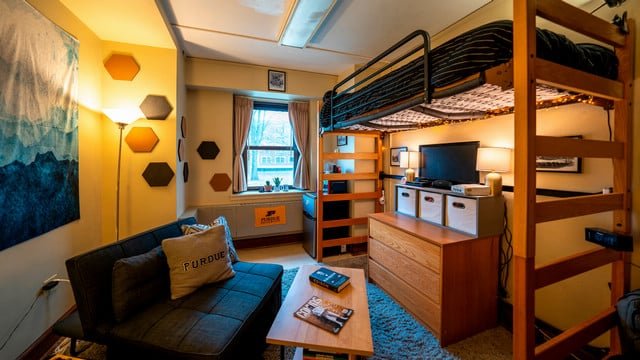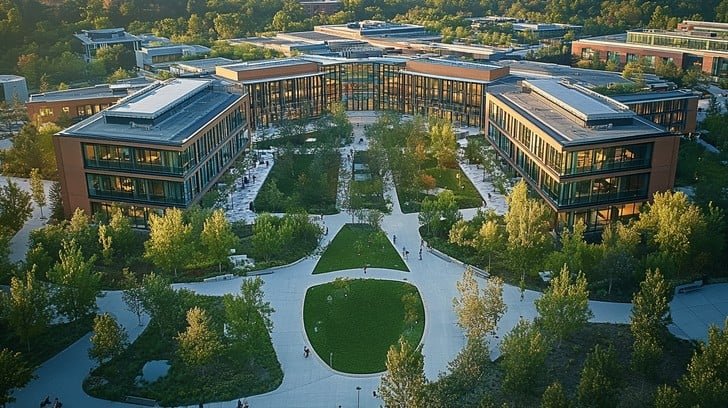Campus housing is one of the most important decisions that incoming students face as they embark on their university journey. The right living situation can contribute to academic success, social life, and personal growth, while poor housing choices may lead to discomfort and distractions. Choosing the best campus housing option depends on various factors such as location, amenities, cost, and personal preferences. In this article, we will explore the best options for campus housing at universities and provide answers to some of the most frequently asked questions about student living arrangements.
Key Takeaways
- Traditional dormitories are affordable and promote social interaction but lack privacy.
- Suite-style housing offers a balance between social engagement and privacy.
- Apartment-style housing provides the highest level of independence but comes at a higher cost.
- Themed housing communities allow students with shared interests to live together and foster supportive academic environments.
- Cost, location, social life, amenities, and housing flexibility are key factors to consider when choosing campus housing.
Types of Campus Housing

Universities typically offer a variety of campus housing options to accommodate students’ diverse needs. These include traditional dormitories, suite-style residences, apartment-style housing, and even themed living communities. Below, we break down the most common housing options available to students.
1. Traditional Dormitories
Traditional dormitories are the most common and recognizable form of campus housing. These are usually large buildings with multiple floors, where rooms are shared between two or more students. Common areas, such as bathrooms, kitchens, and lounges, are often shared by all residents on a given floor. Dorms are typically located close to academic buildings and have a high level of community interaction.
Pros:
- Affordability: Dorms are typically less expensive than other housing options.
- Social opportunities: Dorms foster a sense of community and provide an opportunity to meet other students, making them a good choice for those seeking a social environment.
- Convenience: Being located on campus makes it easy to attend classes, access dining services, and participate in campus activities.
Cons:
- Lack of privacy: Shared rooms and common spaces can be noisy or uncomfortable for some students.
- Limited space: The rooms are often small and lack many personal amenities.
- Less control: Students have little control over who they live with, which can result in roommate conflicts.
2. Suite-Style Housing
Suite-style housing combines elements of both traditional dormitories and apartment-style living. In this type of housing, students live in smaller suites that typically consist of two or more bedrooms, a shared bathroom, and sometimes a small kitchenette or common area. Suites may house a group of 4–8 students, providing more privacy than a traditional dorm but still maintaining a communal feel.
Pros:
- More privacy: Students have separate bedrooms, but still share common spaces.
- Better amenities: Many suite-style dorms offer small kitchens, private bathrooms, and comfortable lounge areas.
- Balance of social and private spaces: It’s easier to make new friends while also having space for quiet study or relaxation.
Cons:
- Higher cost: Suite-style housing is generally more expensive than traditional dormitories.
- Less community feel: While suites can foster closer-knit groups, they may not offer as much opportunity to interact with a large number of students as traditional dorms.
3. Apartment-Style Housing
Apartment-style housing offers the highest level of independence and privacy for students. These living spaces typically include private bedrooms, bathrooms, a fully-equipped kitchen, and a common living area. Apartment complexes may be located on or off-campus, and they often accommodate a small group of students, usually 2–4 people per apartment.
Pros:
- Independence: Apartment living provides more freedom, as students have control over their own space, schedule, and cooking.
- Privacy: Each student usually has their own room and private bathroom.
- Full amenities: Apartment-style housing comes with kitchens, refrigerators, and other amenities that are often not available in dorms.
Cons:
- Higher cost: Apartments are generally the most expensive housing option on campus.
- Less social interaction: With more private living spaces, students may miss out on the chance to interact with a large number of peers.
- Maintenance: Depending on the institution, students might be responsible for handling some aspects of maintenance and upkeep.
4. Themed Housing Communities
Many universities offer themed living communities, where students with similar academic interests, cultural backgrounds, or hobbies can live together. These communities may be housed in dormitories, suites, or apartments and are often linked to specific academic programs or extracurricular activities.
Pros:
- Shared interests: Living with students who share similar passions or goals can create a supportive and motivating environment.
- Focused study and activities: Some themed communities may offer academic support, career-building opportunities, or specialized events.
- Networking: Students in themed communities often form strong networks with peers and faculty in their field of interest.
Cons:
- Limited diversity: Living in a themed community might limit exposure to students with different backgrounds or interests.
- Niche focus: The benefits of themed housing may not be as appealing for students who want a more diverse or general living experience.
5. Graduate Student Housing
Graduate student housing is designed specifically for advanced students who are further along in their academic journey. These options often include apartments or townhouses that offer a quieter, more independent living experience compared to undergraduate housing.
Pros:
- Greater privacy and independence: Graduate student housing usually provides private rooms and more autonomy in day-to-day living.
- Academic environment: These housing options often provide a quieter and more focused atmosphere for students pursuing graduate degrees.
Cons:
- Availability: Graduate housing may be more limited in terms of availability and locations.
- Cost: Graduate student housing may be more expensive than traditional dormitories due to the added amenities and privacy.
Factors to Consider When Choosing Campus Housing

When selecting campus housing, students should weigh several factors to ensure they make the best decision for their needs and preferences.
1. Cost
Cost is often one of the most significant factors when choosing campus housing. While traditional dormitories are generally the most affordable, suite-style housing and apartments may offer more amenities but at a higher cost. It’s essential for students to consider their budget and what they can afford while factoring in other living expenses, such as food, transportation, and entertainment.
2. Location
The location of campus housing can significantly impact a student’s experience. Living in a dormitory or suite-style housing that’s located close to academic buildings, dining halls, and recreational facilities can save time and make daily life more convenient. Apartment-style housing, especially off-campus options, may require more commuting time but might offer more privacy and space.
3. Social Life
Campus housing plays a major role in a student’s social experience. For those who want to meet a wide range of people and participate in campus events, living in a traditional dormitory or suite-style residence is a great choice. On the other hand, students who value privacy or already have established social circles may prefer apartment-style housing or graduate student housing.
4. Amenities
Different types of campus housing offer varying amenities. While some dorms may include basic features like Wi-Fi, laundry facilities, and meal plans, apartments tend to come with kitchens, private bathrooms, and more space. Students should consider what amenities they need for a comfortable living experience and which options fit their lifestyle.
5. Housing Duration and Flexibility
Some housing options may have set dates for move-in and move-out, such as dorms and suites that follow the academic calendar. Apartments, however, may offer more flexibility, allowing students to stay year-round or renew leases for extended periods. It’s essential to consider whether the housing arrangement matches your academic schedule and long-term needs.
Types of Campus Housing and How to Choose the Right One for You
Campus housing comes in many different forms, and each offers a unique experience. From traditional dormitories to private apartments, the choices available depend on personal preferences, financial constraints, and academic needs. In this article, we delve into various types of campus housing options available at universities and provide insights into how to select the right one for your lifestyle.
The most common types of campus housing include traditional dormitories, suite-style housing, apartment-style housing, and themed communities. Each option offers different levels of privacy, social interaction, cost, and convenience. Understanding what each housing type offers, and considering factors such as budget, academic schedules, and social needs, can help students make a more informed decision about where to live.
Why Campus Housing is Essential for First-Year Students
For first-year students, campus housing is often the first step toward independence and adulthood. But beyond just a place to live, campus housing plays a crucial role in the academic and social experience of university life.
Living on campus allows new students to acclimate to university life more quickly by providing easy access to classes, libraries, dining halls, and social events. Moreover, living on campus increases opportunities for personal development and making lasting friendships, as first-year students often bond over shared experiences. This article will explore why living in campus housing is particularly beneficial for first-year students and how it can support their overall success during their transition to university life.
The Pros and Cons of Living on Campus Versus Off-Campus Housing
Choosing between on-campus and off-campus housing is one of the biggest decisions students will face during their university years. While on-campus housing offers the convenience of proximity to academic buildings and dining facilities, off-campus housing provides more privacy, space, and potentially lower costs.
In this article, we compare the advantages and disadvantages of both living situations, covering aspects such as cost, commute time, social life, independence, and overall convenience. For students who are deciding whether to live on campus or find off-campus housing, this comparison can help determine which option is best suited to their needs and lifestyle.
How to Budget for Campus Housing: Tips for Managing Living Expenses
For many students, campus housing represents one of the largest expenses during their time at university. In addition to rent, there are often additional costs for meal plans, utilities, laundry, and internet access. Learning how to manage and budget for these expenses is crucial for financial well-being.
This article provides practical tips for budgeting for campus housing, including how to estimate living costs, how to save money on essentials, and how to balance living expenses with other financial responsibilities. We will also cover the pros and cons of meal plans, room upgrades, and other related costs that can impact a student’s overall budget.
What to Expect from Campus Housing Amenities: A Complete Guide
Campus housing amenities can range from basic features such as Wi-Fi and laundry facilities to more advanced offerings like fitness centers, study lounges, and even swimming pools. Understanding what amenities are typically included with various types of housing options can help students make more informed decisions when selecting where to live.
This article explores the various amenities offered at university housing, breaking down the differences between dormitories, apartments, and suites. It will also examine how amenities can impact student satisfaction and daily life, from studying in quiet spaces to enjoying recreational activities and fitness options.
The Social Life in Campus Housing: Making Friends and Building Connections
One of the biggest benefits of living in campus housing is the opportunity to meet new people and build lifelong friendships. Whether it’s through shared dorm rooms, community events, or social activities organized by residence halls, campus housing provides a natural environment for students to bond.
This article delves into the social aspects of campus housing, offering advice on how to make the most of living in a residence hall. Topics include getting involved in campus activities, joining residence hall organizations, and creating lasting connections with roommates and neighbors. It will also explore how living in close proximity to others can positively impact social development during university years.
Campus Housing Safety: Ensuring a Secure Living Environment

Safety is a top priority when choosing any type of housing, and campus housing is no exception. Universities typically invest in security measures to ensure that students are safe in their living environments. These measures can include things like 24-hour security, key card access, surveillance cameras, and resident advisors who monitor student behavior.
This article covers the various safety measures typically found in campus housing, as well as practical tips for students to stay safe while living on campus. We will discuss how to protect personal belongings, how to handle emergencies, and how students can take proactive steps to ensure their safety in dorms or apartments.
The Impact of Living in Themed Housing Communities on Your University Experience
Themed housing communities are an increasingly popular option at universities. These living arrangements group students based on shared interests, academic pursuits, or cultural backgrounds, creating unique opportunities for engagement and academic support.
In this article, we explore the different types of themed housing communities available, from honors programs and language immersion groups to sustainability-focused living arrangements. We discuss how living in these specialized communities can enhance the university experience, foster collaboration, and build stronger academic or social networks.
How to Handle Roommate Conflicts in Campus Housing
Living with a roommate in campus housing can be one of the most rewarding, yet challenging, experiences during university. Conflicts are inevitable, whether due to differences in personality, lifestyle habits, or study routines. Learning how to navigate these challenges is an essential part of living in a shared space.
This article offers practical advice on how to address and resolve roommate conflicts in campus housing. It covers tips for effective communication, setting boundaries, and working with residence staff to resolve disputes. It also explores the importance of mutual respect and compromise in maintaining a peaceful living environment.
What Makes Graduate Student Housing Different from Undergraduate Housing?
Graduate student housing is often distinct from undergraduate housing in terms of amenities, living arrangements, and atmosphere. For graduate students, who tend to have different needs, priorities, and schedules, the living situation can significantly impact academic performance and overall well-being.
This article explores the key differences between graduate and undergraduate campus housing, focusing on factors such as quiet study spaces, independent living arrangements, and greater privacy. We will also discuss the advantages of living in graduate-specific housing, including closer proximity to research centers and fewer distractions compared to undergraduate housing.
Sustainable Campus Housing: How Universities Are Going Green
In response to growing environmental concerns, many universities are beginning to offer more sustainable campus housing options. From energy-efficient buildings and renewable energy sources to waste-reduction programs and eco-friendly amenities, sustainability is becoming an important consideration in campus housing design.
This article examines the rise of sustainable campus housing, looking at how universities are incorporating green practices into dorms, suites, and apartment buildings. It will also explore how students can get involved in sustainability efforts on campus and the benefits of living in an eco-friendly environment.
Read More:- How Can University Campus Promote Sustainability And Green Initiatives?
Conclusion
Choosing the best campus housing option depends on a variety of factors, including budget, location, privacy preferences, and the desire for social engagement. Each option, whether it’s a traditional dormitory, suite-style housing, apartment-style living, or themed housing community, offers distinct benefits and challenges. Ultimately, students should consider their personal preferences and academic goals to determine the living arrangement that best suits their needs.
FAQs:-
1. What is the most affordable campus housing option?
Traditional dormitories are usually the least expensive option for students. However, the affordability of housing can vary by university and location.
2. Can I choose my roommate in a dormitory or suite?
Some universities offer the ability to request a roommate, while others assign roommates randomly. It’s best to check with your university’s housing office for specific policies.
3. What is the difference between suite-style and apartment-style housing?
Suite-style housing includes shared living spaces (e.g., bathrooms and lounges), while apartment-style housing offers complete independence with private bedrooms, bathrooms, and kitchens.
4. Can graduate students live in the same housing as undergraduates?
While some universities offer separate housing options for graduate students, others may allow them to live with undergraduates, especially in larger apartment-style buildings. Check with your university for availability.
5. What if I need to move out early or extend my stay?
Most universities have policies regarding early move-outs and extended stays. Some housing contracts may allow for exceptions, but students typically need to request these changes in advance.
6. Is it possible to live off-campus but still be involved in university activities?
Yes, living off-campus doesn’t preclude participation in campus activities. Many off-campus students still take part in student organizations, events, and academic programs.
7. What are the benefits of themed housing communities?
Themed housing communities offer students a chance to live with peers who share similar academic interests or hobbies. These communities often foster strong networks, academic support, and a more focused environment for personal and academic growth.





